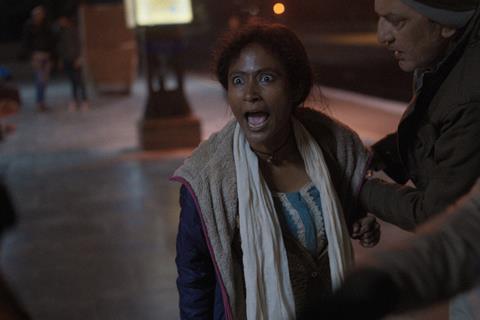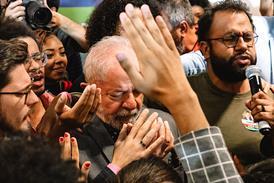Stolen baby drama from India spins out at a breakneck pace for debut director Karan Tejpal

Dir. Karan Tejpal. India. 2023. 94mins
Ostensibly laying out its stall as a low-key social concern drama, Indian feature Stolen morphs into an investigative thriller before abruptly going full-throttle as an actioner – with other shifts of register en route. Some of these may feel awkward, even ill-advised, but holding the film together to compelling effect is the fiercely energetic direction from Karan Tejpal (previously an AD on high-profile titles including 2009’s 3 Idiots) and some involving character development; notably via Abhishek Banerjee as a self-absorbed fop whose conscience is gradually awakened in an ordeal of fire. Unveiled in Venice’s Orizzonti Extra sidebar, the loosely-based-on-real-life Stolen has its Asian premiere in the Mumbai Film Festival and its brisk accessibility should ensure further worldwide traction (Blue Finch Films have acquired it for the UK and Ireland).
Tejpal sails close to the wind as far as audience credulity is concerned
An opening caption signals the key theme – ’two disparate Indias’ at odds, occasionally colliding. The action begins with a close-up of a sleeping woman and a baby: the woman is impoverished Jhumpa (Mia Maelzer), whose rest at a railway station is disrupted when someone grabs baby Champaa and runs off, leaving her desperately seeking help from whoever is around. Two people who happen to be present are a young man, Raman (a relaxed, simpatico performance by Shubham), and his older brother Gautam (Banerjee), both due to attend the wedding of their wealthy mother. Raman is suspected of involvement in the crime and curtly quizzed by two callous, officious local policemen. The officers are not swayed by shows of social privilege, as the imperious Gautam discovers when he tries to pull rank.
While Gautam can’t wait to get back to his own life, his more empathetic brother is anxious to help Jhumpa. The drama moves on, heading for a place referred to in subtitles as the ‘cursed manor’ – a run-down house in the countryside. Raman and a reluctant Gautam drive there with Jhumpa, but a casual roadblock by villagers who suspect the brothers – their faces having gone viral on social media – only signals the start of their problems. After Gautam accidentally, and dramatically, wipes out a promising lead, night turns to early morning and the brothers find themselves the quarry of an armed and angry mob.
This is where the film makes its first abrupt jump in tone, as a largely downbeat realist register is succeeded by all-out frenzy, with the brothers and Jhumpa fleeing an implacable multitude – racing across stark, desert-like terrain or playing tag in and out of the labyrinthine alleys of a secluded village. Tejpal sails close to the wind as far as audience credulity is concerned with his debut, sometimes taking the action perilously to the brink of unintentional comedy as fresh detachments of pursuers on bike or on foot pop up abruptly around every corner. As events near a conclusion, however, it becomes clear that Stolen isn’t dealing in mere cartoon violence, and the brutality becomes startlingly, bloodily real in a way that previous events have barely prepared us for.
The film is certainly what you’d call a ride – quite literally, its central trio barely stopping once Stolen leaves the calm of the railway station (and even there, Isshaan Ghosh’s camera is restless in its exploration of all corners of the darkened building). Director Tejpal paces things cleverly, favouring long takes and compressing the action so that events seem to race along as if in real time, even though the action covers a night and a large part of a day. The pace is often dizzying, even disorienting, with characters dropping in and out unexpectedly – notably with the policemen falling out of the picture to be replaced later by a more sympathetic and authoritative inspector (Harish Khanna).
The real incident that inspired the film involved two young men wrongly accused of child kidnapping, one of hundreds of cases of mob justice that Tejpal has alluded to in interviews. If Stolen is to be seen as a social issue drama, however, the result isn’t entirely convincing – his brothers seem to be caught up in an only sometimes realistic nightmare in which their assailants are depicted as a faceless mass, with individuals picked off as abruptly as figures in a video game. By contrast, a more generally pervasive critique of social injustice and indifference to suffering is prevalent from the start, both in the station cops and in the figure of Gautam.
That character’s name, the film-makers have noted, is a reference to the prince Siddhartha Gautama, later the Buddha – and the slow-burning redemptive awakening of a spoilt bourgeois scion gives the film a convincing psychological layer. With a quizzical physiognomy that makes him ideal for playing soft, pampered figures, Banerjee gives a nifty character sketch of a snooty urbanite (his constant switching between Hindi and English a signifier of self-conscious sophistication) who cannot wait to turn his back on painful reality, only to find it staring him in the face.
Running the gamut from faintly flustered loftiness to all-out desperation, tempered by new empathy, Banerjee’s performance helps shift Stolen into an altogether more compelling gear than it might otherwise have reached. Mia Maelzer’s Jhumpa also undergoes unexpected changes, revealing more than one unsuspected secret along the way and progressing from panicked vulnerability to a much more energetic agency by the end.
Production company: Jungle Book Studio
International sales: Charades sales@charades.eu
Producer: Gaurav Dhingra
Screenplay: Karan Tejpal, Agadbumb, Gaurav Dhingra
Cinematography: Isshaan Ghosh
Editing: Shreyas Beltangdy
Production design: Neeraj Kumar Singh
Music: Arpád Bondy
Main cast: Abhishek Banerjee, Mia Maelzer, Shubham, Harish Khanna





















